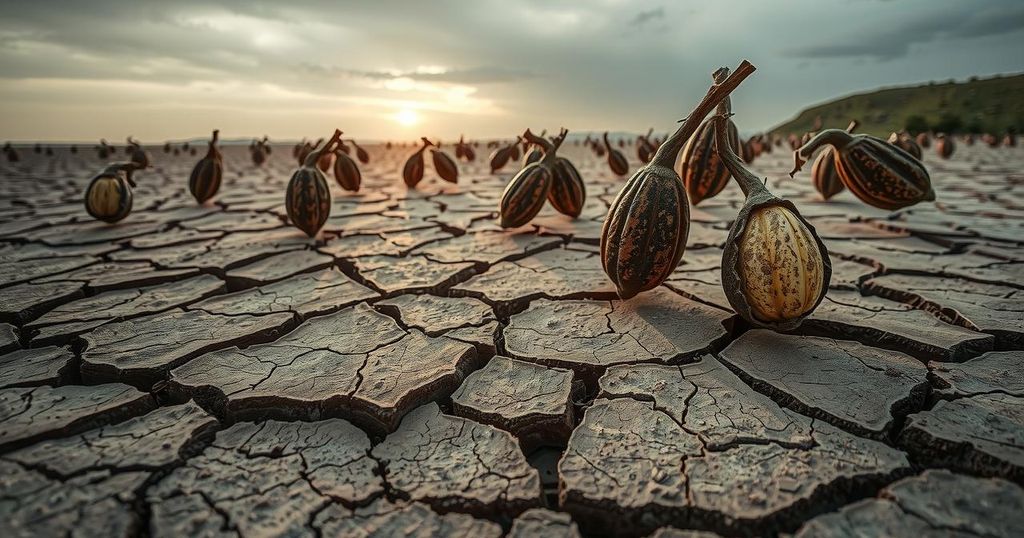Impact of Climate Change on Cocoa Production and Prices in Africa

Climate change is critically harming cocoa production in West Africa, exacerbating extreme temperatures and affecting crop yields. This has led to soaring cocoa prices on global markets, threatening farmers’ livelihoods. Both climate data and insights from charities and researchers highlight the urgent need for action to mitigate the ramifications of climate change on this vital agricultural sector.
A recent study highlights the adverse impact of climate change on cocoa production in West Africa, contributing to significant price increases. The research indicates that warmer temperatures, driven primarily by the burning of fossil fuels, have resulted in longer periods of heat detrimental to cacao trees in pivotal producing countries such as Ivory Coast and Ghana, which together constitute around 70% of the global supply. Farmers in these regions have experienced not only heat but also diseases and erratic rainfall patterns that impact yields.
The study from Climate Central utilized data from 44 cacao-producing areas, comparing current climatic conditions to a hypothetical scenario devoid of climate change. Findings revealed that over the past decade, these areas have faced an increase in conditions exceeding 32 degrees Celsius (about 89.6 degrees Fahrenheit) during the crucial growing season from October to March, with significant implications for both quantity and quality of cocoa harvests.
The consequences of these climatic changes have already manifested in cocoa market prices, with New York cocoa prices surging due to failed harvests. As of late March 2024, prices hovered around $10,000 per tonne, significantly elevated compared to historical averages. The rising costs have prompted some companies, such as Swiss chocolate manufacturer Lindt & Spruengli, to announce price hikes to sustain profit margins amidst fluctuating cocoa prices, which have not seen such volatility in decades.
Additionally, the report from Christian Aid underscores the precarious situation faced by cocoa farmers. Increasingly erratic weather has transitioned conditions from extreme rainfall affecting crops to drought scenarios, undermining the livelihoods of those dependent on cocoa farming. As stated by Osai Ojigho, director of Christian Aid’s policy, climate change poses a substantial threat to these farmers, significantly impacting one of the world’s most vital and vulnerable agricultural sectors.
The existential threat to cacao cultivation is underscored by academic insights, indicating that over three-quarters of land globally has become drier over the last 30 years, exacerbated by excessive greenhouse gas emissions. Professor Narcisa Pricope emphasized the necessity of collective efforts to combat aridity to not only preserve chocolate production but also safeguard the planet’s ecological balance and capacity to foster life.
In summary, climate change has critically threatened cocoa production in West Africa, leading to increased prices and compromised harvests. Research indicates worsening weather patterns and higher temperatures detrimental to cacao trees. These climatic challenges significantly impact farmers’ livelihoods and the global chocolate industry, necessitating urgent action to address the broader environmental and economic implications following the current trends.
Original Source: www.sciencealert.com







